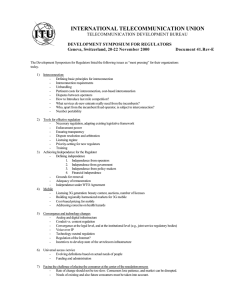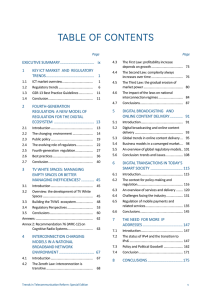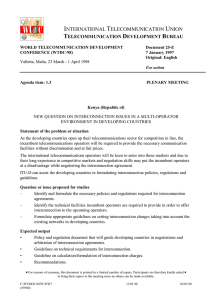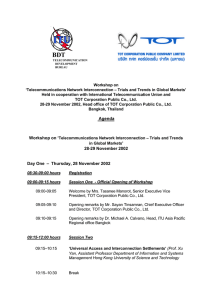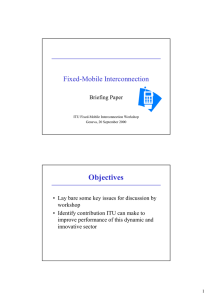F -M I
advertisement
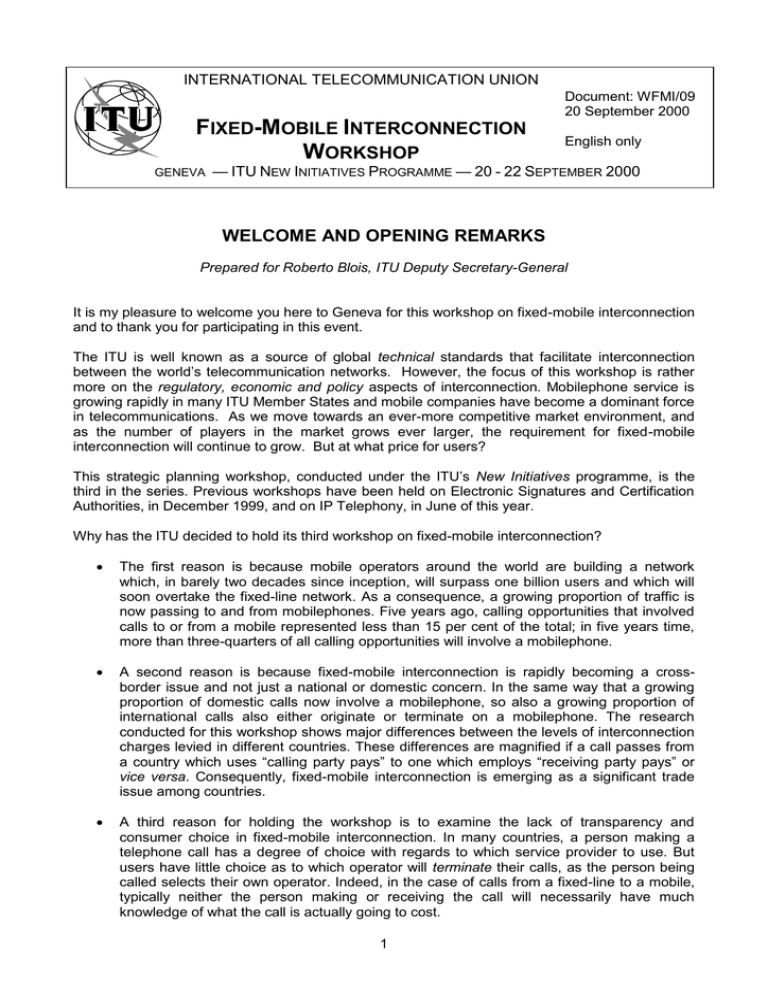
INTERNATIONAL TELECOMMUNICATION UNION Document: WFMI/09 20 September 2000 FIXED-MOBILE INTERCONNECTION WORKSHOP GENEVA English only — ITU NEW INITIATIVES PROGRAMME — 20 - 22 SEPTEMBER 2000 WELCOME AND OPENING REMARKS Prepared for Roberto Blois, ITU Deputy Secretary-General It is my pleasure to welcome you here to Geneva for this workshop on fixed-mobile interconnection and to thank you for participating in this event. The ITU is well known as a source of global technical standards that facilitate interconnection between the world’s telecommunication networks. However, the focus of this workshop is rather more on the regulatory, economic and policy aspects of interconnection. Mobilephone service is growing rapidly in many ITU Member States and mobile companies have become a dominant force in telecommunications. As we move towards an ever-more competitive market environment, and as the number of players in the market grows ever larger, the requirement for fixed-mobile interconnection will continue to grow. But at what price for users? This strategic planning workshop, conducted under the ITU’s New Initiatives programme, is the third in the series. Previous workshops have been held on Electronic Signatures and Certification Authorities, in December 1999, and on IP Telephony, in June of this year. Why has the ITU decided to hold its third workshop on fixed-mobile interconnection? The first reason is because mobile operators around the world are building a network which, in barely two decades since inception, will surpass one billion users and which will soon overtake the fixed-line network. As a consequence, a growing proportion of traffic is now passing to and from mobilephones. Five years ago, calling opportunities that involved calls to or from a mobile represented less than 15 per cent of the total; in five years time, more than three-quarters of all calling opportunities will involve a mobilephone. A second reason is because fixed-mobile interconnection is rapidly becoming a crossborder issue and not just a national or domestic concern. In the same way that a growing proportion of domestic calls now involve a mobilephone, so also a growing proportion of international calls also either originate or terminate on a mobilephone. The research conducted for this workshop shows major differences between the levels of interconnection charges levied in different countries. These differences are magnified if a call passes from a country which uses “calling party pays” to one which employs “receiving party pays” or vice versa. Consequently, fixed-mobile interconnection is emerging as a significant trade issue among countries. A third reason for holding the workshop is to examine the lack of transparency and consumer choice in fixed-mobile interconnection. In many countries, a person making a telephone call has a degree of choice with regards to which service provider to use. But users have little choice as to which operator will terminate their calls, as the person being called selects their own operator. Indeed, in the case of calls from a fixed-line to a mobile, typically neither the person making or receiving the call will necessarily have much knowledge of what the call is actually going to cost. 1 A fourth reason is that with, the emergence of mobile data and multimedia services, more complex user pricing models are likely to appear. Therefore, interconnection agreements based simply on minutes of use may need to evolve to more complex models, that factor in the increased bandwidth usage of future third generation mobile Internet services. If fixed-mobile interconnection rates were lower, there would be less reason for concern. But rates in many countries are high and, what’s more, they are often asymmetric, according to whether a particular call originates on a mobilephone or a fixed-line telephone. There is no obvious costjustification for such high prices. One of the purposes of the ITU, as stated in the Constitution, is to foster collaboration among our Members to achieve rates as low as possible, but still economically sustainable. This is closely related to another goal, which is to extend the benefits of telecommunications technologies to all the world’s inhabitants. Today’s fixed-mobile interconnection rates might be viewed as somewhat inconsistent with these goals. Let me illustrate this by reference to the situation in Europe. In some European cities, it costs roughly four times as much to call from a telephone to a mobilephone across the other side of town as it does to make the same call to a mobilephone in Hawaii, on the other side of the world. Indeed, prices for calls to mobilephones in Europe are so high that traffic is often routed out of the country where the call is made and back in again to disguise it as an incoming international call; a practice known as mobile tromboning. In a competitive consumer market, high interconnection rates provide a very convenient excuse for high retail prices: in other words, it is always the other operator’s fault. In a recent development, one of the mobile service providers in Switzerland has started offering its customers a payment of 5 centimes per minute (just over 3 US cents) for receiving calls. Indeed, if you have a lot of friends but never make outgoing calls, the operator might end up paying you rather than the traditional relationship where the customer pays the service provider! In reality, the operator is just sharing the benefits gained from non-cost-oriented tariffs with the customer. But there seems to be something wrong in a world in which customers benefit at the expense of their friends. Not only is pricing a significant issue, but in many countries, particularly developing ones, technical access to interconnection and the modalities of interconnection arrangements with incumbents has become a significant barrier to entry for new mobile operators. Also, the degree to which the terms for fixed-mobile interconnection offered by incumbents are fair and non-discriminatory is sometimes questionable. There are many different dimensions to the issue of interconnection that we hope to explore in this workshop. Mobile-fixed interconnection is a complicated issue, and in two and a half days, we can only touch upon a few of the dimensions of the problem. So, what do we expect as the outcome of this workshop? An informed analysis and discussion of the problem and why rates vary so much from one country to the next is an important first step in addressing the issues raised by interconnection. In this regard, the ITU has commissioned country case studies of China/Hongkong SAR, Finland, India and Mexico, which will be discussed this afternoon. We also look forward to hearing the experiences of the other countries represented in this workshop as to their own situations. A second objective for the workshop is to promote a free and frank exchange of views on the issue. Those participating in this workshop represent a wide range of interests that do not always agree, including fixed-line operators, mobile service providers and regulators. But the meeting is not being recorded and there will be no formal summary record. So please feel free to express your views in an open manner. 2 Finally, we would hope that this workshop can provide some clear guidance as to the possible role that ITU might play in the future in the area of fixed-mobile interconnection. The ITU has already established a website devoted to this subject and is helping to compile a database of different rates around the world. It is hoped that this will assist regulators and others who find they have to negotiate or approve interconnection agreements without having relevant information as to how this issue is being handled elsewhere. But is there more that ITU could do, for instance, in the area of benchmarking, or dispute settlement or in promoting lower rates? To conclude, I hope that you will benefit from the discussions here over the next two and a half days, but more than that, I hope that you contribute as well. It is, after all, up to you, the participants, to make this workshop a success. ******************************** In order to help make the workshop a success, we need someone to help steer and guide our deliberations. I therefore would like to nominate Prof. Rohan Samarajiva as Chairman: Rohan Samarajiva is Visiting Professor of Economics of Infrastructure at the Delft University of Technology in the Netherlands and Senior International Specialist at the National Regulatory Research Institute in the USA. He previously served as Director General of the Telecommunications Regulatory Commission of Sri Lanka and as Associate Professor of Communication at the Ohio State University in the United States. He is a member of the ITU's Expert Group on International Telecommunication Regulations. Rohan has lectured at regulatory training programs organized by the South Asian Forum for Infrastructure Regulation (SAFIR), the National Association of Regulatory Utility Commissioners (NARUC) and the University of Florida in the USA, the Adam Smith Institute in the United Kingdom, and the World Bank. He has provided expert assistance to government authorities, regulatory agencies and consumer and citizen groups in Canada, Australia, and several US states. I hope you will welcome Prof. Samarajiva as the Chairman of this Workshop. 3
